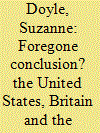| Srl | Item |
| 1 |
ID:
154817


|
|
|
|
|
| Summary/Abstract |
Existing studies of the United Kingdom’s purchase of Trident D5 missiles have simplified the Reagan administration’s sale. Using previously classified documentation, this article highlights the potential political and financial ramifications of a sale agreement that led to complex deliberations within the Thatcher government up until the final day of negotiations. The White House viewed the sale as a means to strengthen Western nuclear and conventional forces to counter the perceived Soviet threat. However, even within this conducive environment, US officials still drove a hard bargain with their British counterparts, in order to support US strategic interests. Indeed, the White House utilised the sale to influence British defence policy. In this way, the Trident agreement was not a foregone conclusion but rather a continuation of the friendly, but not preordained, nature of US–UK nuclear relations that has been renegotiated, according to the varying interests of both parties, throughout the partnership's existence.
|
|
|
|
|
|
|
|
|
|
|
|
|
|
|
|
| 2 |
ID:
155066


|
|
|
|
|
| Summary/Abstract |
This article provides a comparative analysis of the sales of the Trident nuclear missile system to Britain by the Jimmy Carter and Ronald Reagan administrations. Both governments viewed the Anglo–American nuclear partnership as a tool within their wider foreign policy kit and utilised the sale of Trident to influence British defence policy. For these reasons, each administration saw the Trident sale as part of an Anglo–American transactional defence relationship. This exegesis deepens understanding of the United States perspective on Anglo–American nuclear co-operation. Moreover, it is relevant to current debates on the replacement of Trident because it highlights the ramifications of Britain’s technical dependence and raises questions about the concessions that may have been made, or will need to be made, to the United States in exchange for the latter’s assistance with replacement.
|
|
|
|
|
|
|
|
|
|
|
|
|
|
|
|